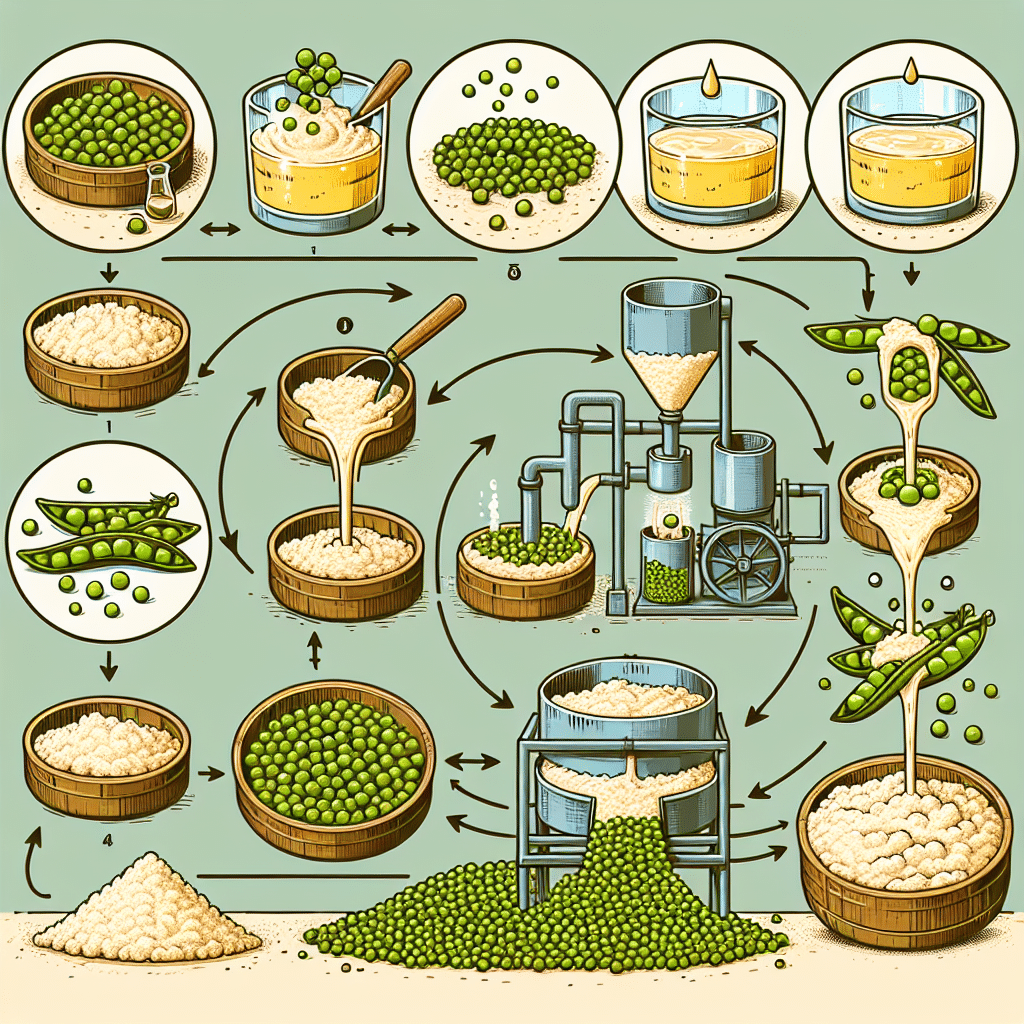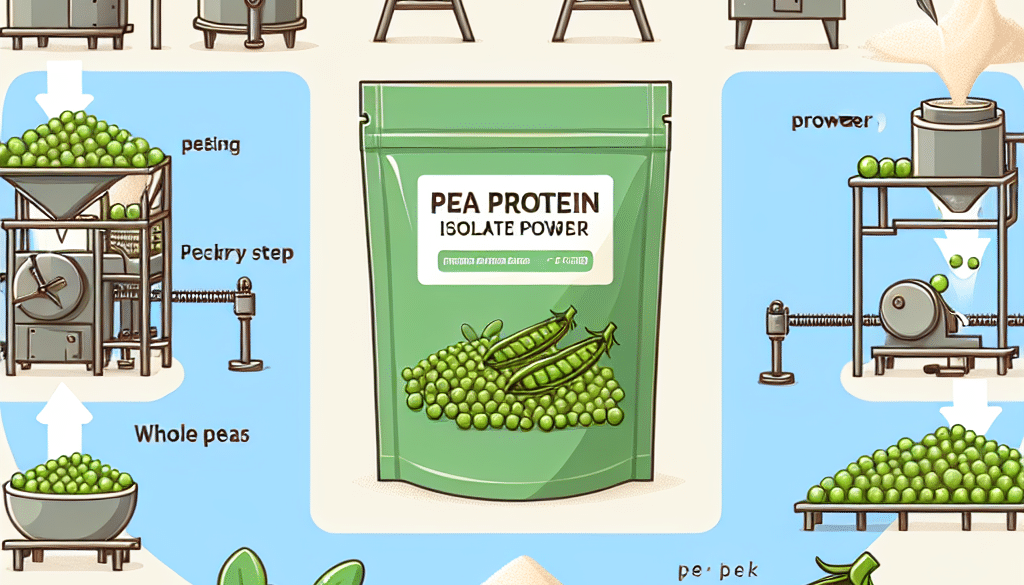Is Pea Protein Highly Processed? Discover More
Table of Contents
- Pea Protein: Is It Highly Processed or a Healthy Alternative?
- Understanding Pea Protein Processing
- Comparing Processing Levels
- Nutritional Profile and Health Benefits
- Environmental and Ethical Considerations
- Case Studies and Research
- Conclusion: Balancing Processing and Nutrition
- Discover ETprotein’s High-Quality Pea Protein Products
Pea Protein: Is It Highly Processed or a Healthy Alternative?

Pea protein has become a popular plant-based alternative to animal-derived proteins, especially among vegetarians, vegans, and those with dietary restrictions. As the demand for sustainable and allergen-free protein sources grows, it’s important to understand the processing involved in producing pea protein and its implications for health and nutrition.
Understanding Pea Protein Processing
Pea protein is derived from yellow split peas and is a high-quality protein that contains all nine essential amino acids. The process of making pea protein typically involves several steps:
- Harvesting and cleaning the peas to remove impurities.
- Milling the peas into flour.
- Using water or a water-ethanol mixture to separate the protein from the fiber and starch.
- Precipitating the protein by adjusting the pH.
- Drying the protein into a powder form.
While this process may seem extensive, it’s important to note that “highly processed” is a term that can be misleading. The degree of processing does not necessarily correlate with the healthfulness of a food product. In the case of pea protein, the processing is necessary to isolate the protein and make it digestible and bioavailable for human consumption.
Comparing Processing Levels
When compared to other protein sources, pea protein’s processing is relatively minimal. For example, whey protein, a common animal-based protein supplement, undergoes a process that includes pasteurization, filtration, and drying. Similarly, soy protein often involves hexane extraction, a chemical process to separate the protein from fats.
Pea protein’s processing avoids harsh chemicals and typically uses water-based methods, which can be considered more natural and environmentally friendly. Additionally, the lack of common allergens like lactose or gluten in pea protein makes it a safe choice for many consumers.
Nutritional Profile and Health Benefits
Despite the processing, pea protein retains a robust nutritional profile. It is rich in branched-chain amino acids (BCAAs), which are crucial for muscle building and repair. Pea protein is also high in iron and can be easily fortified with vitamins and minerals during processing.
Health benefits associated with pea protein include:
- Supporting muscle growth and maintenance.
- Helping with weight management due to its satiating effect.
- Being suitable for people with allergies to dairy or soy.
- Having a lower environmental impact compared to animal-based proteins.
Environmental and Ethical Considerations
One of the compelling reasons for choosing pea protein is its environmental sustainability. Peas require less water and fertilizer than other crops and can fix nitrogen in the soil, reducing the need for chemical fertilizers. The production of pea protein also generates fewer greenhouse gases compared to animal-based proteins.
From an ethical standpoint, pea protein offers a cruelty-free alternative to animal proteins, aligning with the values of vegans and vegetarians. It also provides an option for those concerned about the welfare of animals in the food industry.
Case Studies and Research
Several studies have highlighted the benefits of pea protein. For instance, a 2015 study published in the Journal of the International Society of Sports Nutrition found that pea protein promoted muscle thickness gains just as effectively as dairy-based whey protein in athletes.
Another study in Food & Function in 2019 reported that pea protein hydrolysates showed potential anti-inflammatory and antioxidant activities, suggesting additional health benefits beyond its protein content.
Conclusion: Balancing Processing and Nutrition
In conclusion, while pea protein undergoes processing to isolate the protein from the peas, it is not “highly processed” in a way that detracts from its nutritional value or health benefits. The methods used are generally less harsh than those for some animal-based or other plant-based proteins, and the end product is a nutrient-dense, environmentally friendly protein source.
The key takeaways for consumers are:
- Pea protein processing is necessary and does not inherently reduce its healthfulness.
- Pea protein is a complete protein source with a strong amino acid profile.
- It offers environmental and ethical advantages over many animal-based proteins.
- Research supports its effectiveness for muscle building and potential health benefits.
For those looking to incorporate pea protein into their diets, it’s important to choose products from reputable companies that prioritize quality and sustainability in their processing methods.
Discover ETprotein’s High-Quality Pea Protein Products
If you’re interested in adding pea protein to your diet, ETprotein offers a range of high-quality pea protein products. Their pea protein is characterized by a neutral taste, non-GMO, and allergen-free attributes, making it an excellent choice for various dietary needs.
ETprotein’s commitment to quality ensures that their pea protein maintains a high level of purity and nutritional value, providing you with a clean and effective protein source. Whether you’re looking to enhance your sports nutrition, manage your weight, or simply improve your overall health, ETprotein has a pea protein product to meet your needs.
Contact ETprotein today to learn more about their pea protein offerings and how they can benefit your health and wellness journey.
About ETprotein: ETprotein, a reputable protein and L-(+)-Ergothioneine (EGT) Chinese factory manufacturer and supplier, is renowned for producing, stocking, exporting, and delivering the highest quality organic bulk vegan proteins and L-(+)-Ergothioneine. They include Organic rice protein, clear rice protein, pea protein, clear pea protein, watermelon seed protein, pumpkin seed protein, sunflower seed protein, mung bean protein, peanut protein, and L-(+)-Ergothioneine EGT Pharmaceutical grade, L-(+)-Ergothioneine EGT food grade, L-(+)-Ergothioneine EGT cosmetic grade, L-(+)-Ergothioneine EGT reference grade and L-(+)-Ergothioneine EGT standard. Their offerings, characterized by a neutral taste, non-GMO, allergen-free attributes, with L-(+)-Ergothioneine purity over 98%, 99%, cater to a diverse range of industries. They serve nutraceutical, pharmaceutical, cosmeceutical, veterinary, as well as food and beverage finished product distributors, traders, and manufacturers across Europe, USA, Canada, Australia, Thailand, Japan, Korea, Brazil, and Chile, among others. ETprotein specialization includes exporting and delivering tailor-made protein powder and finished nutritional supplements. Their extensive product range covers sectors like Food and Beverage, Sports Nutrition, Weight Management, Dietary Supplements, Health and Wellness Products, and Infant Formula, ensuring comprehensive solutions to meet all your protein needs. As a trusted company by leading global food and beverage brands and Fortune 500 companies, ETprotein reinforces China’s reputation in the global arena. For more information or to sample their products, please contact them and email sales(at)ETprotein.com today.













